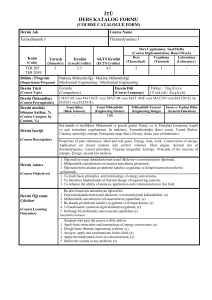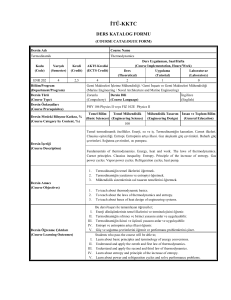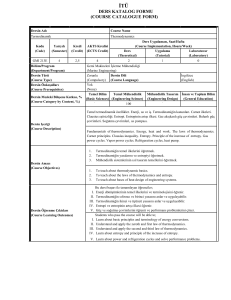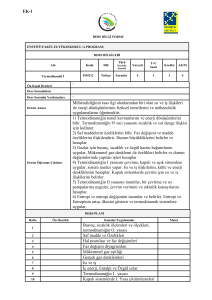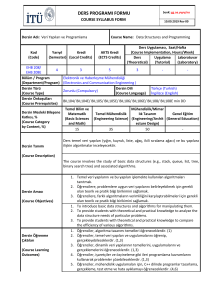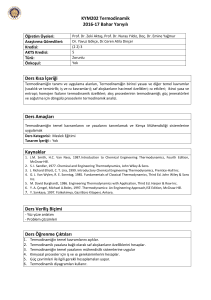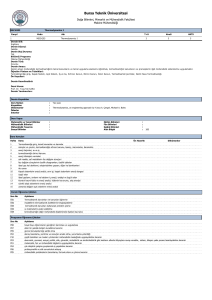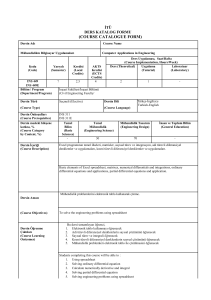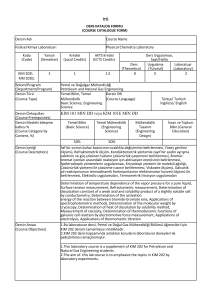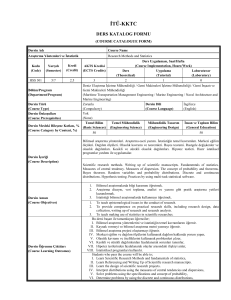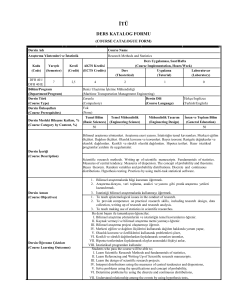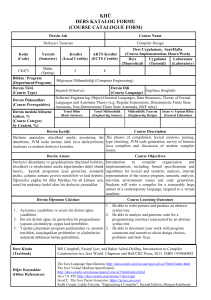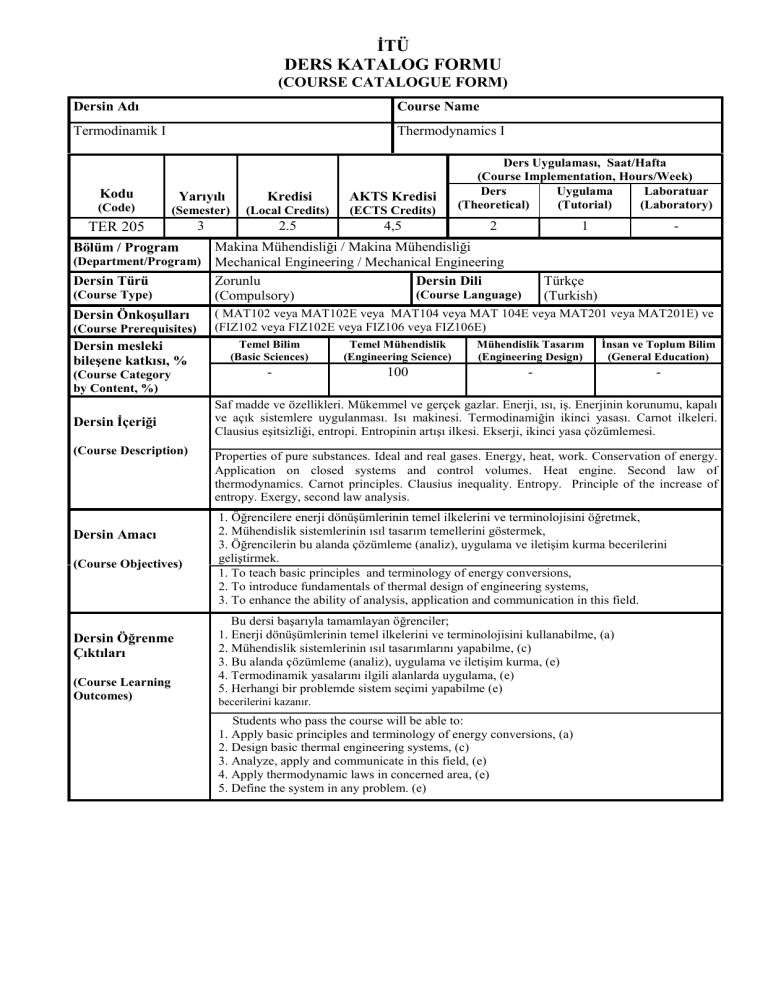
İTÜ
DERS KATALOG FORMU
(COURSE CATALOGUE FORM)
Dersin Adı
Course Name
Termodinamik I
Thermodynamics I
Yarıyılı
Kredisi
AKTS Kredisi
(Code)
(Semester)
(Local Credits)
(ECTS Credits)
TER 205
3
2.5
4,5
Kodu
Bölüm / Program
(Department/Program)
Dersin Türü
(Course Type)
Dersin Önkoşulları
(Course Prerequisites)
Dersin mesleki
bileşene katkısı, %
(Course Category
by Content, %)
Dersin İçeriği
(Course Description)
Dersin Amacı
(Course Objectives)
Dersin Öğrenme
Çıktıları
(Course Learning
Outcomes)
Ders Uygulaması, Saat/Hafta
(Course Implementation, Hours/Week)
Ders
Uygulama
Laboratuar
(Theoretical)
(Tutorial)
(Laboratory)
2
1
Makina Mühendisliği / Makina Mühendisliği
Mechanical Engineering / Mechanical Engineering
Zorunlu
Dersin Dili
(Course Language)
(Compulsory)
-
Türkçe
(Turkish)
( MAT102 veya MAT102E veya MAT104 veya MAT 104E veya MAT201 veya MAT201E) ve
(FIZ102 veya FIZ102E veya FIZ106 veya FIZ106E)
Temel Bilim
(Basic Sciences)
Temel Mühendislik
(Engineering Science)
Mühendislik Tasarım
(Engineering Design)
İnsan ve Toplum Bilim
(General Education)
-
100
-
-
Saf madde ve özellikleri. Mükemmel ve gerçek gazlar. Enerji, ısı, iş. Enerjinin korunumu, kapalı
ve açık sistemlere uygulanması. Isı makinesi. Termodinamiğin ikinci yasası. Carnot ilkeleri.
Clausius eşitsizliği, entropi. Entropinin artışı ilkesi. Ekserji, ikinci yasa çözümlemesi.
Properties of pure substances. Ideal and real gases. Energy, heat, work. Conservation of energy.
Application on closed systems and control volumes. Heat engine. Second law of
thermodynamics. Carnot principles. Clausius inequality. Entropy. Principle of the increase of
entropy. Exergy, second law analysis.
1. Öğrencilere enerji dönüşümlerinin temel ilkelerini ve terminolojisini öğretmek,
2. Mühendislik sistemlerinin ısıl tasarım temellerini göstermek,
3. Öğrencilerin bu alanda çözümleme (analiz), uygulama ve iletişim kurma becerilerini
geliştirmek.
1. To teach basic principles and terminology of energy conversions,
2. To introduce fundamentals of thermal design of engineering systems,
3. To enhance the ability of analysis, application and communication in this field.
Bu dersi başarıyla tamamlayan öğrenciler;
1. Enerji dönüşümlerinin temel ilkelerini ve terminolojisini kullanabilme, (a)
2. Mühendislik sistemlerinin ısıl tasarımlarını yapabilme, (c)
3. Bu alanda çözümleme (analiz), uygulama ve iletişim kurma, (e)
4. Termodinamik yasalarını ilgili alanlarda uygulama, (e)
5. Herhangi bir problemde sistem seçimi yapabilme (e)
becerilerini kazanır.
Students who pass the course will be able to:
1. Apply basic principles and terminology of energy conversions, (a)
2. Design basic thermal engineering systems, (c)
3. Analyze, apply and communicate in this field, (e)
4. Apply thermodynamic laws in concerned area, (e)
5. Define the system in any problem. (e)
Ders Kitabı
(Textbook)
Diğer Kaynaklar
(Other References)
Ödevler ve Projeler
(Homework & Projects
1- Borgnakke C., Sonntag R.E, “Fundamentals of Thermodynamics”,
International Student Version, 7th Edition, John Wiley & Sons, INC., 2009.
2- Çengel, Y. ve Boles, M., “Mühendislik Yaklaşımıyla Termodinamik”,
(Çev. T. Derbentli), McGraw-Hill ve Literatür, İstanbul, 1996.
3- Çengel, Y. and Boles, M., “Thermodynamics, an Engineering
Approach”,(Trans. T. Derbentli), McGraw-Hill and Literatür, İstanbul, 1996.
Öztürk, A. ve Kılıç, A., “Çözümlü Problemlerle Termodinamik”, Çağlayan
Kitabevi, 1998.
(Öztürk, A. and Kılıç, A., “Thermodynamics with Solved Problems”,
Çağlayan Kitabevi, 1998.)
Öğrencilere her hafta web sayfasında çözmeleri için problemler verilecektir. Öğrenci
isterse, bu problemlerin tümünü veya bir bölümünü değerlendirilmek üzere
verebilecektir.
Problems will be given to students on a weekly basis on website. Students may ask
for assessment of all or some of her/his solved problems.
Laboratuar Uygulamaları
(Laboratory Work)
Bilgisayar Kullanımı
(Computer Use)
Diğer Uygulamalar
(Other Activities)
Başarı Değerlendirme
Sistemi
(Assessment Criteria)
Faaliyetler
(Activities)
Yıl İçi Sınavları
(Midterm Exams)
Kısa Sınavlar
(Quizzes)
Ödevler
(Homework)
Projeler
(Projects)
Dönem Ödevi/Projesi
(Term Paper/Project)
Laboratuar Uygulaması
(Laboratory Work)
Diğer Uygulamalar
(Other Activities)
Final Sınavı
(Final Exam)
Adedi
(Quantity)
2
Değerlendirmedeki Katkısı, %
(Effects on Grading, %)
%60
1
%40
DERS PLANI
Hafta
1
2
3
4
5
6
7
8
9
10
11
12
13
14
Konular
Temel kavramlar ve tanımlar. Boyutlar ve birimler. Sistem. Sistemin özelikleri. Hal ve denge. Hal
değişimleri ve çevrimler. Basınç. Sıcaklık. Termodinamiğin Sıfırıncı Yasası.
Saf madde ve özelikleri. Saf maddenin fazları ve faz değişimi. Özelik diyagramları ve tabloları.
Mükemmel gaz ve hal denklemi. Gerçek gazlar. Sıkıştırılabilme çarpanı. Karşılıklı haller ilkesi.
Diğer hal denklemleri. Termodinamiğin birinci yasasına giriş.
Isı ve iş. Termodinamiğin 1. Yasası (Kapalı sistemler için). Özgül ısılar. Mükemmel gazların iç
enerji, entalpi ve özgül ısıları. Katı ve sıvıların özgül ısıları.
Termodinamiğin 1. Yasası (Açık sistemler için). Kütlenin korunumu. Enerjinin korunumu. Akış
işi. Sürekli akışlı açık sistemler.
Zamanla değişen açık sistemler. Düzgün akışlı dengeli açık sistem.
Termodinamiğin 2. Yasası. Isı makineleri. Soğutma makineleri ve ısı pompaları.
Tersinir ve tersinmez hal değişimleri. Carnot çevrimi. Carnot İlkeleri. Mutlak termodinamik
sıcaklık ölçeği.
Clausius eşitsizliği. Entropi. Entropinin artışı ilkesi. Termodinamiğin Üçüncü Yasası.
Saf maddenin entropi değişimi. Sıcaklık-Entropi (T-s) diyagramı.
Mükemmel gazların entropi değişimleri. Tersinir sürekli akış işi.
Bazı makinelerin adyabatik verimleri.
Kullanılabilirlik (Ekserji) ve İkinci yasa çözümlemesi
Kapalı ve Açık Sistemlerin ikinci yasa çözümlemesi
Dersin
Çıktıları
1
1
1
1-5
3
3
1-3
1-3
2-3-4
1-3
2-3-4
2-3-4
2-3-4
2-3-4
COURSE PLAN
Weeks
1
2
3
4
5
6
7
8
9
10
11
12
13
14
Topics
Basic concepts and definitions. Dimensions and units. System. Properties of System. State and
equilibrium. State change and cycles. Pressure. Temperature. The Zeroth Law of
Thermodynamics.
Pure substance and properties. Phases of pure substance and phase change. Properties
diagrams and tables.
Ideal gas and equation of state. Real gasses. Compressibility factor. Generalized chart for
Compressibility factor. Other equations of state. Introduction to the first law of
Thermodynamics.
Heat and work. First law of Thermodynamics (For closed systems). Specific heats. Internal
energy, enthalpy and specific heat of ideal gasses. Specific heat of solids and liquids.
First law of Thermodynamics (For open systems). Conservation of mass. Conservation of
energy. Flow work. Open systems with steady flow.
Unsteady open systems. The uniform-state, uniform-flow systems. .
Second law of Thermodynamics. Heat engines. Refrigeration systems and heat pumps
Reversible and irreversible processes. Carnot cycles. Carnot principles. The thermodynamic
temperature scale.
Clausius inequality. Entropy. Principle of the increase of Entropy. Third law of
Thermodynamics..
Entropy change of pure substance. Temperature-Entropy (T-s) diagram
Entropy change of ideal gasses. Reversible steady flow work.
Adiabatic efficiency of some engines..
Exergy and second law solution
Second law solution of closed and open systems.
Course
Outcomes
1
1
1
1-5
3
3
1-3
1-3
2-3-4
1-3
2-3-4
2-3-4
2-3-4
2-3-4
Dersin Makina Mühendisliği Programıyla İlişkisi
Programın mezuna kazandıracağı bilgi ve beceriler (programa ait çıktılar)
Katkı
Seviyesi
1 2 3
a
b
c
d
e
f
g
h
i
j
k
l
Matematik, fen bilimleri ve mühendislik bilgisini makina mühendisliği problemlerini çözmede
kullanabilme becerisi
Deney tasarlayıp yürütebilme, sonuçlarını analiz edip yorumlama ve modern araç, gereç ve
teçhizatı kullanabilme becerisi
Bir makinayı, parçasını veya prosesi, beklenen performansı, imalat özelliklerini ve ekonomikliği
sağlayacak şekilde seçme, geliştirme ve tasarlama becerisi
Çok disiplinli takımlarda çalışabilme ve/veya liderlik yapma becerisi
Makina Mühendisliği problemlerini tanımlama, formüle etme ve çözme becerisi
Mesleki ve etik sorumluluk anlayışına sahip olma
Türkçe ve İngilizce etkin yazılı ve sözlü iletişim kurma becerisi
Makina mühendisliğinin ulusal ve küresel boyutlardaki etkileri hakkında bilgi sahibi olma ve
yorum yapabilme becerisi
Hayat boyu (Sürekli) eğitimin önemini kavrama ve uygulayabilme becerisi
Makina mühendisliğinin güncel ve çağdaş konularına ilişkin bilgi sahibi olma
Mühendislik tasarım ve analizlerinde bilgisayar yazılımları gibi modern mühendislik yöntemlerini
ve çağdaş bilgi erişim olanaklarını kullanabilme becerisi
Öğrencinin seçtiği makina mühendisliği uygulama alanlarından birinde daha ayrıntılı bilgi ve
uygulama deneyimi
X
X
X
1: Yok, 2. Kısmi, 3. Tam
Relationship between the Course and Mechanical Engineering Curriculum
Level of
Contribution
1
2
3
Program Outcomes
a
b
c
d
e
f
g
h
i
j
k
l
An ability to apply knowledge of mathematics, science, and engineering on mechanical
engineering problems
An ability to design and conduct experiments, as well as to analyze and interpret data and use
modern tools and equipment.
An ability to select, develop and/or design a system, component, or process to meet desired
performance, manufacturing capabilities and economic requirements.
An ability to function on and/or develop leadership in multi-disciplinary teams.
An ability to identify, formulate, and solve mechanical engineering problems.
An understanding of professional and ethical responsibility
An ability for effective written and oral communication in Turkish and English.
An ability to understand and comment on the impact of engineering solutions in a national and
global context.
A recognition of the need for, and an ability to engage in life-long learning
A knowledge of contemporary issues in mechanical engineering
An ability to use the techniques, skills, and modern engineering tools , such as computer
programs, necessary for engineering design and analysis and use modern information systems
A detailed knowledge of and experience on a specific application field of mechanical
engineering
1: None, 2. Partial, 3. Full
Düzenleyen (Prepared by)
Tarih (Date)
Doç.Dr. Mustafa ÖZDEMİR
14.04.2011
İmza (Signature)
X
X
X

